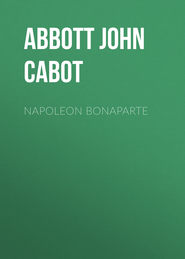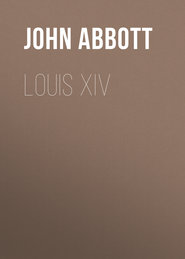По всем вопросам обращайтесь на: info@litportal.ru
(©) 2003-2024.
✖
Hortense. Makers of History Series
Настройки чтения
Размер шрифта
Высота строк
Поля
"He did not wait for our reply, but went in quest of his old shoes, which he brought to us with an air of exultation, and offered them to Hortense, who received the gift with every demonstration of delight.
"We set to work with the greatest alacrity, and my daughter was enabled, towards the close of the day, to enjoy the pleasure of again amusing the ship's company. I repeat it, that no present was ever received by me with more sincere gratitude. I greatly reproach myself for having neglected to make inquiries after the worthy seaman, who was only known on board by the name of James. I should have felt a sincere satisfaction in rendering him some service, since it was afterwards in my power to do so."
Commencement of the Reign of Terror. Arrest of Beauharnais.
Josephine had spent three years in Martinique. Consequently, upon her return to France, Hortense was six years of age. Soon after her arrival the Reign of Terror commenced. The guillotine was erected, and its knife was busy beheading those who were suspected of not being in full sympathy with the reformers whom revolution had brought into power. Though Viscount Beauharnais had earnestly espoused the popular cause; though he had been president of the National Assembly, and afterwards general of the Army of the Rhine, still he was of noble birth, and his older brother was an aristocrat, and an emigrant. He was consequently suspected, and arrested. Having conducted him to prison, a committee of the Convention called at the residence of Josephine to examine the children, hoping to extort from them some evidence against their father. Josephine, in a letter to her aunt, thus describes this singular scene:
Domiciliary visit.
"You would hardly believe, dear aunt, that my children have just undergone a long and minute examination. That wicked old man, the member of the committee whom I have already mentioned to you, called upon me, and, affecting to feel uneasy in regard to my husband, and to converse with me respecting him, opened a conversation with my children. I acknowledge that I at first fell into the snare. What surprised me, however, was the sudden affability of the man. But he soon betrayed himself by the malignity and even bitterness which he displayed when the children replied in such a manner as to give him no advantage over their unhappy parents. I soon penetrated his artful intentions.
"When he found me on my guard, he threw off the mask, and admitted that he was desired to procure information from my children, which, he said, might be more relied on, as it would bear the stamp of candor. He then entered into a formal examination. At that moment I felt an indescribable emotion; and the conflicting effects of fear, anger, and indignation alternately agitated me. I was even upon the point of openly giving vent to my feelings against the hoary revolutionist, when I reflected that I might, by so doing, materially injure M. de Beauharnais, against whom that atrocious villain appeared to have vowed perpetual enmity. I accordingly checked my angry passions. He desired me to leave him alone with my children; I attempted to resist, but his ferocious glance compelled me to give way.
"He confined Hortense in the closet, and began to put questions to her brother. My daughter's turn came next. As for this child, in whom he discovered a premature quickness and penetration far above her age, he kept questioning her for a great length of time. After having sounded them respecting our common topics of conversation, our opinions, the visits and letters we were in the habit of receiving, but more particularly the occurrences they might have witnessed, he came to the main point—I mean, to the expressions used by Alexander. My children gave very proper replies; such, in fact, as were suited to their respective dispositions. And notwithstanding the artfulness of a mischievous man whose object is to discover guilt, the frankness of my son and the quick penetration of my daughter disconcerted his low cunning, and even defeated the object he had in view."
Beauharnais in prison.
Viscount Beauharnais, when arrested, was conveyed to the palace of the Luxembourg, where he was imprisoned with many other captives. To spare the feelings of the children, the fact of his imprisonment was concealed from them by Josephine, and they were given to understand that their father, not being very well, had placed himself under the care of a celebrated physician, who had recommended him to take up his residence at the Luxembourg, where there was much vacant space, and consequently purer air. The imprisoned father was very anxious to see his wife and children. The authorities consented, allowing the children to go in first under the care of an attendant, and afterwards their mother.
Hortense, child as she was, was bewildered by the scene, and her suspicions were evidently excited. As she came out, she said to her mother, "I think papa's apartments are very small, and the patients are very numerous."
Affecting interview.
After the children had left, Josephine was introduced. She knew that her husband's life was in imminent peril. His penitence and grateful love had produced entire reconciliation, and had won back Josephine's heart. She was not willing that the children should witness the tender and affecting interview which, under such circumstances, must take place.
Beauharnais had but little hope that he should escape the guillotine. As Josephine, bathed in tears, rushed into his arms, all his fortitude forsook him. His emotion was so great that his wife, struggling against her own anguish, used her utmost endeavors to calm and console him.
In the midst of this heart-rending scene, to their consternation, the children, by some misunderstanding, were again led into the apartment. The father and mother struggled to disguise from them the cause of that emotion which they could not conceal. For a time the children were silent and bewildered; then Hortense, though with evident misgivings, attempted to console her parents. The events of her saddened life had rendered her unusually precocious. Turning to her mother, she begged her not to give way to so much sorrow, assuring her that she could not think that her father was dangerously ill. Then addressing Eugene, she said, in a peculiar tone which her parents felt as a reproach,
"I do not think, brother, that papa is very sick. At any rate, it is not such a sickness as doctors can cure." Josephine felt the reproach, and conscious that it was in some degree deserved, said:
"What do you mean, my child? Do you think your father and I have combined to deceive you?"
"Pardon me, mamma, but I do think so."
"Oh, sister," exclaimed Eugene, "how can you speak so strangely?"
"On the contrary," Hortense replied, "it is very plain and natural. Surely affectionate parents may be allowed to deceive their children when they wish to spare their feelings."
Josephine was seated in the lap of her husband. Hortense sprang into her mother's arms, and encircled the neck of both father and mother in a loving embrace. Eugene caught the contagion, and by his tears and affecting caresses added to this domestic scene of love and woe.
It is the universal testimony that Eugene and Hortense were so lovely in person and in character that they instantly won the affection of all who saw them. The father was conscious that he was soon to die. He knew that all his property would be confiscated. It was probable that Josephine would also be led to her execution. The guillotine spared neither sex who had incurred the suspicions of enthroned democracy. Both parents forgot themselves, in their anxiety for their children. The execution of Beauharnais would undoubtedly lead to the arrest and execution of Josephine. The property of the condemned was invariably confiscated. There was thus danger that the children would be turned in beggary into the streets. It is difficult to conceive the anguish which must have rent the hearts of affectionate parents in hours of woe so awful.
Scene in prison.
The prisons were crowded with victims. Brief as were the trials, and rapid as was the execution of the guillotine, there was some considerable delay before Beauharnais was led before the revolutionary tribunal. In the mean time Josephine made several calls, with her children, upon her imprisoned husband. Little Hortense, whose suspicions were strongly excited, watched every word, and soon became so convinced that her father was a prisoner that it became impossible for her parents any longer to conceal the fact.
"What has papa done," inquired Hortense, "that they will not let him come home?"
"He has done nothing wrong," said Josephine, timidly, for she knew not what spies might be listening. "He is only accused of being unfriendly to the Government."
Holding the hand of Eugene, Hortense exclaimed impetuously, "Oh, we will punish your accusers as soon as we are strong enough."
"Be silent, my child," said her father anxiously. "If you are overheard I am lost. Both your mother and I may be made to suffer for any imprudent remark which you may make."
"But, papa, have you not often told us," said Eugene, "that it was proper to resist an act of oppression?"
"Yes," said the father proudly, though conscious that his words might be reported and misrepresented to his merciless judges. "And I repeat it. Our conduct, however, must be guided by rules of prudence; and whoever attempts to defeat the views of tyranny must beware of awaking it from its slumbers."
No philosophy has yet been able to explain the delicate mechanism of the human soul; its fleeting and varying emotions of joy and sadness, its gleams of hope and shades of despair come and go, controlled by influences which entirely elude human scrutiny. In these days of gloom, rays of hope occasionally penetrated the cell of Beauharnais.
Trial of Beauharnais.
At last the hour of dread came. Beauharnais was led before the terrible tribunal. He was falsely accused of having promoted the surrender of Mentz to the Allies. He was doomed to death, and was sent to the Conciergerie, whence he was to be conducted to his execution. This was in July, 1794. Beauharnais was then thirty-four years of age.
It seems that the conversation which we have reported as having taken place in the cell of Beauharnais had been overheard by listening ears, and reported to the committee as a conspiracy for the overthrow of the Republic. The arrest of Josephine was ordered. A warning letter from some friend reached her a few moments before the officers arrived, urging her to fly. It was an early hour in the morning. There was little sleep for Josephine amidst those scenes of terror, and she was watching by the side of her slumbering children. What could she do? Should she abandon her children, and seek to save her own life by flight? A mother's love rendered that impossible. Should she take them with her in her flight? That would render her arrest certain; and the fact of her attempting to escape would be urged as evidence of her guilt.
Anguish of Josephine.
While distracted with these thoughts, the clatter of armed men was heard at her door. With anguish which none but a mother can comprehend, she bent over her children and imprinted, as she supposed, a last kiss upon their cheeks. The affectionate little Hortense, though asleep, was evidently agitated by troubled dreams. As she felt the imprint of her mother's lips, she threw her arms around her neck and exclaimed, "Come to bed, dear mamma; they shall not take you away to-night. I have prayed to God for you."
Arrest of Josephine.
Josephine, to avoid waking the children, stepped softly from the room, closed the door, and entered her parlor. Here she was rudely seized by the soldiers, who regarded her as a hated aristocrat. They took possession of the house and all its furniture in the name of the Republic, left the children to suffer or to die as fate might decide, and dragged the mother to imprisonment in the Convent of the Carmelites.
When the children awoke in the morning, they found themselves alone and friendless in the heart of Paris. The wonderful events of their lives thus far had rendered them both unusually precocious. Eugene in particular seemed to be endowed with all the thoughtfulness and wisdom of a full-grown man. After a few moments of anguish and tears, in view of their dreadful situation, they sat down to deliberate upon the course to be pursued. Hortense suggested that they should repair to the Luxembourg and seek the protection of their father in his imprisonment there. But Eugene, apprehensive that such a step might in some way compromise the safety of their father, recalled to mind that they had a great-aunt, far advanced in life, who was residing at Versailles in deep retirement. He proposed that they should seek refuge with her. Finding a former domestic of the family, she kindly led them to their aunt, where the desolate children were tenderly received.
Beauharnais was now in the Conciergerie, doomed to die, and awaiting his execution. Josephine was in the prison of the Carmelites, expecting hourly to be led to the tribunal to receive also her doom of death.
Impulsiveness of Hortense.
Hortense, an affectionate child, ardent and unreflecting in her impatience to see her mother, one morning left her aunt's house at Fontainebleau, to which place her aunt had removed, and in a market-cart travelled thirty miles to Paris. Here the energetic child, impelled by grief and love, succeeded in finding her mother's maid, Victorine. It was however impossible for them to obtain access to the prison, and Hortense the next day returned to Fontainebleau. Josephine, upon being informed of this imprudent act, to which affection had impelled her child, wrote to her the following letter:
Letter from Josephine.
"I should be entirely satisfied with the good heart of my Hortense, were I not displeased with her bad head. How is it, my daughter, that, without permission from your aunt, you have come to Paris? 'But it was to see me, you will say.' You ought to be aware that no one can see me without an order, to obtain which requires both means and precautions. And besides, you got upon M. Dorset's cart, at the risk of incommoding him, and retarding the conveyance of his merchandise. In all this you have been very inconsiderate. My child, observe: it is not sufficient to do good, you must also do good properly. At your age, the first of all virtues is confidence and docility towards your relations. I am therefore obliged to tell you that I prefer your tranquil attachment to your misplaced warmth. This, however, does not prevent me from embracing you, but less tenderly than I shall do when I learn that you have returned to your aunt."
On the evening of the 24th of July M. de Beauharnais received the announcement in his cell, that with the dawn of the next morning he was to be led to the guillotine. Under these circumstances he wrote the following farewell letter to his wife:
Letter from Beauharnais.
"I have yet a few minutes to devote to affection, tears, and regret, and then I must wholly give myself up to the glory of my fate and to thoughts of immortality. When you receive this letter, my dear Josephine, your husband will have ceased to live, and will be tasting true existence in the bosom of his Creator. Do not weep for him. The wicked and senseless beings who survive him are more worthy of your tears, for they are doing mischief which they can never repair. But let us not cloud the present moments by any thoughts of their guilt. I wish, on the contrary, to brighten these hours by the reflection that I have enjoyed the affection of a lovely woman, and that our union would have been an uninterrupted course of happiness, but for errors which I was too late to acknowledge and atone for. This thought wrings tears from my eyes, though your generous heart pardons me. But this is no time to revive the recollection of my errors and of your wrongs. What thanks I owe to Providence, who will reward you.
"That Providence disposes of me before my time. This is another blessing, for which I am grateful. Can a virtuous man live happy when he sees the whole world a prey to the wicked? I should rejoice in being taken away, were it not for the thought of leaving those I love behind me. But if the thoughts of the dying are presentiments, something in my heart tells me that these horrible butcheries are drawing to a close; that the executioners will, in their turn, become victims; that the arts and sciences will again flourish in France; that wise and moderate laws will take the place of cruel sacrifices, and that you will at length enjoy the happiness which you have deserved. Our children will discharge the debt for their father.
"I resume these incoherent and almost illegible lines, which were interrupted by the entrance of my jailer. I have submitted to a cruel ceremony, which, under any other circumstances, I would have resisted at the sacrifice of my life. Yet why should we rebel against necessity? Reason tells us to make the best of it we can. My hair has been cut off. I had some idea of buying a part of it, in order to leave to my wife and children an unequivocal pledge of my last recollection of them. Alas! my heart breaks at the very thought, and my tears bedew the paper on which I am writing. Adieu, all that I love. Think of me, and do not forget that to die the victim of tyrants and the martyrs of liberty sheds lustre on the scaffold."
Execution of Beauharnais.











